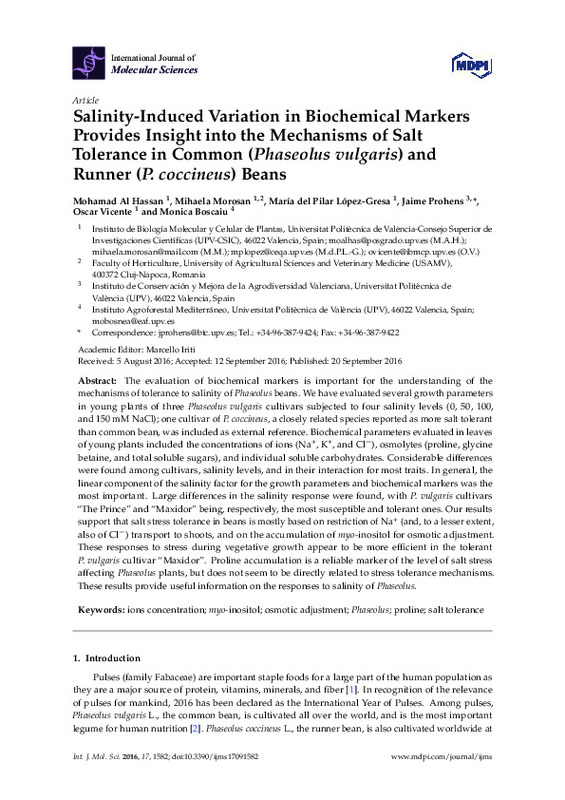JavaScript is disabled for your browser. Some features of this site may not work without it.
Buscar en RiuNet
Listar
Mi cuenta
Estadísticas
Ayuda RiuNet
Admin. UPV
Salinity-Induced Variation in Biochemical Markers Provides Insight into the Mechanisms of Salt Tolerance in Common (Phaseolus vulgaris) and Runner (P. coccineus) Beans
Mostrar el registro sencillo del ítem
Ficheros en el ítem
| dc.contributor.author | Al Hassan, Mohamad
|
es_ES |
| dc.contributor.author | Morosan, Mihaela
|
es_ES |
| dc.contributor.author | López Gresa, María Pilar
|
es_ES |
| dc.contributor.author | Prohens Tomás, Jaime
|
es_ES |
| dc.contributor.author | Vicente Meana, Óscar
|
es_ES |
| dc.contributor.author | Boscaiu Neagu, Mónica Tereza
|
es_ES |
| dc.date.accessioned | 2017-12-21T12:50:36Z | |
| dc.date.available | 2017-12-21T12:50:36Z | |
| dc.date.issued | 2016 | es_ES |
| dc.identifier.issn | 1422-0067 | es_ES |
| dc.identifier.uri | http://hdl.handle.net/10251/93278 | |
| dc.description.abstract | [EN] The evaluation of biochemical markers is important for the understanding of the mechanisms of tolerance to salinity of Phaseolus beans. We have evaluated several growth parameters in young plants of three Phaseolus vulgaris cultivars subjected to four salinity levels (0, 50, 100, and 150 mM NaCl); one cultivar of P. coccineus, a closely related species reported as more salt tolerant than common bean, was included as external reference. Biochemical parameters evaluated in leaves of young plants included the concentrations of ions (Na+, K+, and Cl􀀀), osmolytes (proline, glycine betaine, and total soluble sugars), and individual soluble carbohydrates. Considerable differences were found among cultivars, salinity levels, and in their interaction for most traits. In general, the linear component of the salinity factor for the growth parameters and biochemical markers was the most important. Large differences in the salinity response were found, with P. vulgaris cultivars The Prince and Maxidor being, respectively, the most susceptible and tolerant ones. Our results support that salt stress tolerance in beans is mostly based on restriction of Na+ (and, to a lesser extent, also of Cl􀀀) transport to shoots, and on the accumulation of myo-inositol for osmotic adjustment. These responses to stress during vegetative growth appear to be more efficient in the tolerant P. vulgaris cultivar Maxidor . Proline accumulation is a reliable marker of the level of salt stress affecting Phaseolus plants, but does not seem to be directly related to stress tolerance mechanisms. These results provide useful information on the responses to salinity of Phaseolus | es_ES |
| dc.description.sponsorship | This work was partly funded by a grant from the Spanish Ministry of Science and Innovation (Project CGL2008-00438/BOS), with contribution from the European Regional Development Fund. Mohamad Al Hassan was a recipient of an Erasmus Mundus pre-doctoral scholarship financed by the European Commission (Welcome Consortium). | |
| dc.language | Inglés | es_ES |
| dc.publisher | MDPI AG | es_ES |
| dc.relation.ispartof | International Journal of Molecular Sciences | es_ES |
| dc.rights | Reconocimiento (by) | es_ES |
| dc.subject | Ions concentration | es_ES |
| dc.subject | Myo-inositol | es_ES |
| dc.subject | Osmotic adjustment | es_ES |
| dc.subject | Phaseolus | es_ES |
| dc.subject | Proline | es_ES |
| dc.subject | Salt tolerance | es_ES |
| dc.subject.classification | GENETICA | es_ES |
| dc.subject.classification | BOTANICA | es_ES |
| dc.subject.classification | BIOQUIMICA Y BIOLOGIA MOLECULAR | es_ES |
| dc.title | Salinity-Induced Variation in Biochemical Markers Provides Insight into the Mechanisms of Salt Tolerance in Common (Phaseolus vulgaris) and Runner (P. coccineus) Beans | es_ES |
| dc.type | Artículo | es_ES |
| dc.identifier.doi | 10.3390/ijms17091582 | es_ES |
| dc.relation.projectID | info:eu-repo/grantAgreement/MICINN//CGL2008-00438/ES/RESPUESTAS DE LAS PLANTAS AL ESTRES ABIOTICO: CORRELACION CON LAS CARACTERISTICAS EDAFICAS DE SUS HABITATS NATURALES/ | es_ES |
| dc.rights.accessRights | Abierto | es_ES |
| dc.contributor.affiliation | Universitat Politècnica de València. Departamento de Biotecnología - Departament de Biotecnologia | es_ES |
| dc.contributor.affiliation | Universitat Politècnica de València. Departamento de Ecosistemas Agroforestales - Departament d'Ecosistemes Agroforestals | es_ES |
| dc.description.bibliographicCitation | Al Hassan, M.; Morosan, M.; López Gresa, MP.; Prohens Tomás, J.; Vicente Meana, Ó.; Boscaiu Neagu, MT. (2016). Salinity-Induced Variation in Biochemical Markers Provides Insight into the Mechanisms of Salt Tolerance in Common (Phaseolus vulgaris) and Runner (P. coccineus) Beans. International Journal of Molecular Sciences. 17. doi:10.3390/ijms17091582 | es_ES |
| dc.description.accrualMethod | S | es_ES |
| dc.relation.publisherversion | http://doi.org/10.3390/ijms17091582 | es_ES |
| dc.description.upvformatpinicio | 1582 | es_ES |
| dc.type.version | info:eu-repo/semantics/publishedVersion | es_ES |
| dc.description.volume | 17 | es_ES |
| dc.identifier.pmid | 27657045 | en_EN |
| dc.identifier.pmcid | PMC5037847 | en_EN |
| dc.relation.pasarela | S\324250 | es_ES |
| dc.contributor.funder | Ministerio de Ciencia e Innovación | es_ES |
| dc.contributor.funder | European Commission |








